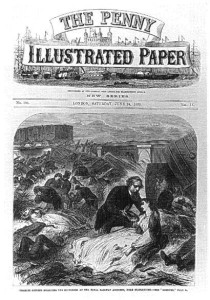 CFP: “Victorian Modernities”
CFP: “Victorian Modernities”
Co-sponsored by: The Centre for Victorian Literature and Culture (University of Kent) &
The Dickens Project (University of California, Santa Cruz)
The University of Kent
June, 25-27 2015
Deadline: January 31, 2015
Keynote speakers: Professor Jonathan Grossman (UCLA) and Dr Ruth Livesey (Royal Holloway)
Featuring a magic lantern show performed by Joss Marsh and David Francis from the Kent Museum of the Moving Image
On June 9, 1865 at 3:30pm, Charles Dickens came close to losing his life when the South Eastern train in which he was travelling from Folkestone to London derailed while crossing a viaduct near Staplehurst in Kent. While Dickens and his travelling companions - Ellen Ternan and her mother – survived, ten passengers were killed and forty were injured. The accident affected him greatly, and he continued to suffer “sudden rushes of terror, even when riding in a hansom cab”, as he confessed a year after the event. The grim ghost story that emerged from this traumatic experience to be published in All the Year Round – “No. 1 Branch Line. The Signalman” – contrasts markedly with the ebullient celebration of railway speed in “A Flight” – his earlier account of travelling from London to Paris for Household Words. While Dickens’s early responsiveness to the symbolism of the railway and embrace of the connections enabled by new technological and industrial processes may have made him a “leader of the steam-whistle party par excellence” as Ruskin claimed, his writing also resonates with many of the anxieties and instabilities we associate with modernity.
The 150th anniversary of the Staplehurst railway accident in June 2015 provides us with an occasion to reflect upon the ambivalence that distinguished the Victorians’ multifaceted engagement with the complex concept we now refer to as modernity. The committee welcomes proposals that address any aspect of Victorian modernities and especially encourage interdisciplinary approaches. Topics may include but are not limited to:
- Modern mobilities: transport, travel and tourism
- Victorian New Media: print, audio and visual technologies
- Cosmopolitanism and the Victorian global imagination
- Industrial fatigue, shock and trauma
- Victorian advances in science and medicine
- Neo-Victorianism
- Commodity culture and consumerism
- Modern spaces and temporalities, including the city
- Victorian avant-garde movements and/or new genres
- New Victorian social types: new women, decadents, dandies etc
- Narratives of belatedness, decay, apocalypse or nostalgia: challenges or resistances to modernity in the Victorian period
Deadline for proposals (20 minute papers): January 31, 2015. Please submit 300 word abstracts for 20 minute papers to:victorianmodernities2015@gmail.com Enquiries can be sent to Cathy Waters (c.waters@kent.ac.uk) or Wendy Parkins (w.j.parkins@kent.ac.uk)